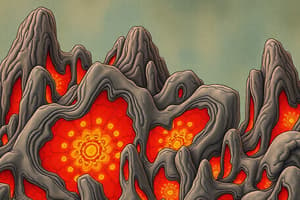Podcast
Questions and Answers
What type of rocks result from slow cooling of magma?
What type of rocks result from slow cooling of magma?
- Coarse-grained plutonic rocks (correct)
- Fine-grained volcanic rocks
- Nepheline
- Basalts
Which rock types are more plentiful among plutonic rocks than the others combined?
Which rock types are more plentiful among plutonic rocks than the others combined?
- Olivine
- Basalts
- Granites and granodiorites (correct)
- Andesites
What is the result of rapid cooling during an eruption?
What is the result of rapid cooling during an eruption?
- Coarse-grained plutonic rocks
- Finer-grained volcanic rocks (correct)
- Olivine
- Granites
Which mineral is formed when the melt is deficient in silica?
Which mineral is formed when the melt is deficient in silica?
What factor influences the rate of chemical weathering during soil formation?
What factor influences the rate of chemical weathering during soil formation?
What is the primary reason that sedimentary rocks are important for soil formation?
What is the primary reason that sedimentary rocks are important for soil formation?
Which of the following is NOT a type of sedimentary rock mentioned in the passage?
Which of the following is NOT a type of sedimentary rock mentioned in the passage?
What is the primary mechanism by which calcium carbonate and dolomite accumulate in sedimentary limestone deposits?
What is the primary mechanism by which calcium carbonate and dolomite accumulate in sedimentary limestone deposits?
Which type of metamorphic rock is formed by the compression and alteration of shales and mudstones?
Which type of metamorphic rock is formed by the compression and alteration of shales and mudstones?
What is the defining characteristic of quartzite, a metamorphic rock?
What is the defining characteristic of quartzite, a metamorphic rock?
Flashcards are hidden until you start studying




